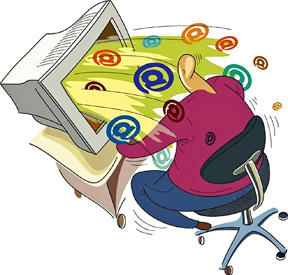How spam came
Dilmika Tennakoon
The word ‘spam’ came to use in 1996. Billions
of spam messages are sent to subscribers world wide, per day; sent to
many in duplicates, forced on those who would otherwise choose not to
receive it
The term spam can be defined as network abuse; from junk e-mail and
massive junk posting to Usenet (the world’s largest online conferencing
system). Spammers use mass e-mailing software to send junk e-mails to
subscribers without their knowledge or consent.
|

Spammers fill the recipient mailbox with unwanted mail |
The first internet e-mail spam was sent on May 3, 1978 by Digital
Equipment Corporation (DEC) to all ARPANET addresses on the west coast
of the United Sates, inviting people to receptions in California. Today
marks the 33rd anniversary of spam.
The first commercial spammers were two lawyers from Phoenix, named
Canter and Siegel. It was the first deliberate mass commercial posting
which was sent in April 1994. An abusive posting called ‘Green Card
Lottery’ sponsored by the government was their first commercial spam. It
was a fee-based legal service for enrolling immigrants in a ‘Green Card
Lottery.’ This was the first commercial spam and the first mass posting.
The word ‘spam’ came to use in 1996. These junk mail are beneficial
to some and are useless to the masses. Billions of spam messages are
sent to subscribers world wide, per day. The same message is sent to
many in duplicates, forced on those who would otherwise choose not to
receive it.
It is not just a junk mail easily deleted from inboxes. Most spam
messages are commercial advertisements on products, get rich scams or
lotteries and other scams that cheat money out of the gullible.
Categories
Spam can be divided in to two categories, namely ‘Cancellable Usenet
spam’ and ‘e-mail spam’. Each of these categories have different impacts
on Internet users.
Cancellable Usenet spam is a single message. It is sent to more than
20 Usenet newsgroups. According to Usenet users the messages posted to
these newsgroups are usually not relevant to them. Spam messages are
mostly a load of advertising or other irrelevant posts.
Email spam is sent to individuals in direct e-mail messages. In order
to create the e-mail spam list, spammers usually scan Usenet posts,
steal the internet mail list or search the Web for addresses.
Spammers use automated tools to subscribe mailing lists and retrieve
the lists of addresses. They then use the mailing lists to attack
subscribers and fill the recipient mailbox with unwanted mail.
The cost of the spam is paid by the receiver. People who use measured
phone services have to pay additional money when they receive spam.
Abusive spam
The first well known Usenet spam was sent by Clarence L Thomas, a
system administrator. The message was sent on January 18, 1994. It read
‘Global Alert for All: Jesus is Coming Soon.’,$.
Dave Rhodes ‘Make Money Fast’ post was the classic unwanted post on
Usenet for many years. This was a chain letter and large number of
people received it and posted to newsgroups for no good reason. Finally
many were blamed and some got away from the fraud.
However there are lawsuits about Spam and laws created in order to
reduce the production in US. These laws prevent spam companies from
operating in foreign countries. Rustock the world’s largest spam network
was brought down by Microsoft’s Digital Crimes Unit for sending billions
of spam e-mails per day. Worldwide spam was reduced 40 percent by
bringing down Rustock.
Many use Spam filtering software which is included in most versions
of anti virus software to reduce receiving Spam. However spammers are
quite adept in sidestepping these filters. |



